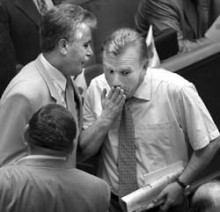During the first six months of this year the Ministry of Internal Affairs exposed 242 cases of bribery in the educational system. According to ministry data, this is an increase of some three or four percent over last year. As The Day reported earlier, health and education are still sectors that are easily accessible to corrupt individuals: one-fifth of all bribes end up in the pockets of these civil servants. Statistics collected by the State Economic Crime Prevention Service indicate that both the amounts of bribes and numbers of cases are growing in these sectors every year. Bribing traditionally soars in January/February and June/July. These are the months when university students are writing exams and graduates are trying to apply to higher educational establishments. Comparing data from 2005 and 2006, it’s easy to see a trend: there is a 50-percent increase in sums offered or demanded. This year the average Ukrainian bribe is estimated at UAH 8,500. According to Leonid Skalozub, chief of the Economic Crime Prevention Service, bribes in education match the general picture and range from UAH 500 ($100) to UAH 60,000 ($12,000), Interfax-Ukraina reports. For example, in 2006 out of nearly 600 solved cases of economic crimes more than 450 involve bribery, nepotism, extortion, and other abuses of authority. A total of 119 people have been prosecuted, including two rectors, five deputy rectors, and seven deans at higher educational institutions. Skalozub provided some details about several bribery cases. Traditionally, people pay for the same things: good marks, entering a university, avoiding expulsion. A deputy rector at Kyiv University of Culture and Arts extorted $100 for “providing assistance during an examination.” In Donetsk the head of the Department of Higher Mathematics at the State Management Academy, who extorted UAH 2,500 bribes in his office for helping students pass their exams, has been sentenced. Lecturers at institutions of higher education in Ukraine are amazingly original and creative. Envelopes and gifts, which can easily be spotted by the naked eye, are a thing of the past. One senior lecturer at Dal National Eastern Ukrainian University extorted bribes on a wholesale basis, receiving up to UAH 1,500 for a group’s good marks. In one Luhansk institution lecturers and their department head have never touched cash. Students received orders to purchase electric appliances or construction materials and were then issued “payment.” They had no problems in passing their exams after producing a cancelled cheque. In 2004-2005 in Dnipropetrovsk oblast faculty members of the Kryvyi Rih Institute of Economy, a branch of Kyiv National University of Economics, issued specialists’ and masters’ diplomas without having the licenses to do so. The amount of money received from students as tuition fees reached UAH 177,000. The Ministry of Internal Affairs claims that its officers regularly investigate institutions of higher education, and both militia and prosecutors always have plenty of work to do there. But neither the economic crime prevention bureau nor the education ministry can say how bribery can be combated or how many cases have gone unpunished. On the eve of impending political shuffles ministers and their deputies are postponing meetings and refusing to comment.
Tuesday, 17 June
- Українська
- Русский
- English
Where there is no law, but every man does what is right in his own eyes, there is the least of real liberty







